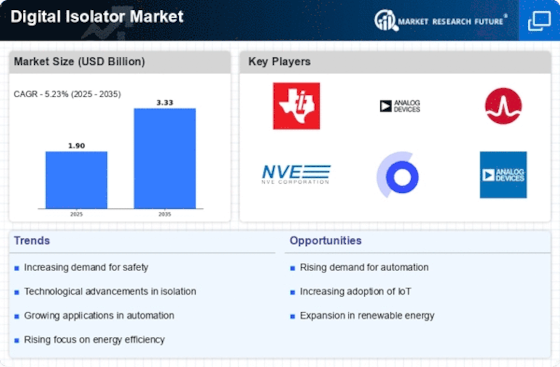Market Share
Digital Isolator Market Share Analysis
Regulations and policies are other factors affecting this market. Governments and regulatory bodies globally are increasingly focusing on electronic systems safety and reliability. This has led to the development of strict regulations which makes these devices become increasingly used in various fields.
Thus, many companies in the digital isolator business adopt market share positioning strategies aimed at gaining competitive advantage or even dominance within the industry. Differentiation is one such strategy where a company concentrates on aspects of its product that make it unique or advanced with regard to digital isolators. Therefore, by offering advantages like high data rates, low power consumption or working with other electronic components; they differentiate themselves from their rivals thus appealing only to a particular customer segment.
Strategic partnerships and collaborations play an important role in positioning a market share. Companies usually partner with others including semiconductors manufacturers or technology providers so as to enhance their products’ value proposition or open up new markets. By leveraging on each other’s strengths strategic partners can make their portfolio of digital isolator broader hence making them more competitive. Companies establish strong brand image to develop confidence in their products, which is essential for market positioning and share. Influencing customer’s purchase choices help generate a positive reputation that will bring in customers. The latter refers to the accentuation of dependability, quality and technological advancements on digital isolators by companies. Market expansion strategies can be geographical or untapped markets. Examples include mergers, acquisitions, subsidiaries and strategic alliance with local partners. To expand their businesses the firms focus on winning more consumers therefore raising the total global market share of digital isolators.
Marketing position strategy includes responsive customer support and service. Good customer care builds loyalty while enhancing the overall experience of customers. It should be noted that companies who lay much emphasis on offering responsible communication channels, technical support, and after-sale services usually take advantage over those whose clients tend to become repeat purchasers as well as promoters of brands they like due to satisfaction.
















Leave a Comment